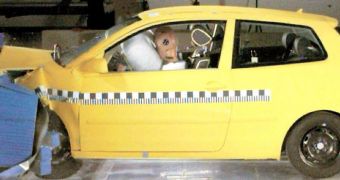During the development of the now-scrapped Hermes spaceplane project, engineers at the European Space Agency (ESA) developed a special foil pressure sensors, to be used on the vehicle's wings. Now, the same tool is used in car crash tests, to make automobiles safer for drivers and passengers.
German automaker giant Volkswagen has developed a super-thin version of the sensor foil, which it uses to measure even the most minute deformations that its cars experience during crash tests.
The foil is based on piezoelectric materials, which are crystals or ceramics that can convert forces, vibrations or movements into measurable electrical signals. “The piezoelectric foil is very thin, about 30 microns – a third of the thickness of a human hair,” German engineer Paul Mirow explains.
VW decided to use these sensors because they are not entirely destroyed during the crashes, like other sensors are. This enables the collection of data throughout the entire process, allowing engineers to understand what's going on in more detail.

 14 DAY TRIAL //
14 DAY TRIAL //